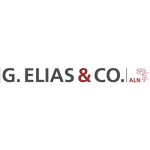Nigeria overhauled key aspects of its M&A and merger control regimes in 2019. Nosakhare Aguebor, Yemisi Falade and Geoffrey Adonu of G Elias & Co investigate the changes
The gradual stabilisation of foreign exchange rates (due to the rise in global oil prices) and the improvement of inflation indices has led to an overall recovery in macroeconomic conditions in Nigeria, which in turn has resulted in a significant growth in M&A in 2018. According to DealMakers Africa, Nigeria was the most active M&A market in Africa in 2018, with a total of 59 deals valued at $4 billion.
Notable deals announced in the period under review spread across private and listed companies. Major deals involving listed companies include the merger between Cement Company of Northern Nigeria and Kalambaina Cement Company, valued at $857 million and the merger of Access Bank and Diamond Bank, valued at circa $200 million.
Major private deals recorded in 2018 include the divestment by Brazil's state-owned oil company Petrobras of its 50% stake in Petrobras Oil and Gas to Petrovida Holding, in a deal worth $1.4 billion; the acquisition by the US cereal maker Kellogg of a 50% stake in Tolaram Africa Foods for $420 million; Coca Cola's acquisition of Chi, a leading Nigerian fruit juice maker; the acquisition of 9Mobile (formerly Etisalat Nigeria) by Teleology Nigeria in a deal valued at circa $500 million; and the investment by Milost Global in Ibeto Cement Company worth $500 million.
Structuring M&A deals in Nigeria
M&A deal structure is determined by tax considerations, regulatory or statutory requirements, operational needs or transferability of liability. Common structures used in M&A deals in Nigeria include asset acquisitions, securities acquisitions and mergers pursuant to court orders. Each structure has its own features and attractions and in some cases, a hybrid of more than one structure is required on a deal. For instance, effecting a merger via a court order ensures the transfer of both assets and liabilities of the target.
The Federal Competition and Consumer Protection Act 2019 (FCCPA), now the nation's merger control statute, recognises all the above deal structures. Under the FCCPA, a merger occurs "when one or more undertakings directly or indirectly acquire or establish direct or indirect control over the whole or part of the business of another undertaking". According to the FCCPA, a merger may be achieved in "any manner" including by: (i) the purchase or lease of the shares, an interest or assets of another undertaking; (ii) the amalgamation or other combination with another undertaking; or (iii) a joint-venture (JV). In effect, the range of transactions that may be regarded as an M&A deal within the purview of the FCCPA is not circumscribed, provided the transaction leads to a change of control, whether directly or indirectly, "over the whole or part of the business of another undertaking". (For more details on deal structures, see below.)
M&A Regulatory Framework
The FCCPA was signed into law by President Muhammadu Buhari on February 5 2019. Prior to its coming into force, the Investments and Securities Act 2007 (ISA) was the merger control statute, with the Securities and Exchange Commission (SEC) created thereunder doubling as both the competition and the securities regulator.
The FCCPA introduced a new merger control regime and established the Federal Competition and Consumer Protection Council (the Commission) as the new merger control regulator with powers to "authorise, with or without conditions, prohibit or approve mergers". Further, the provisions of the ISA or any other law or regulation are to be read with requisite modifications as to bring them in conformity with the FCCPA.
The FCCPA is a pure competition law statute, hence the SEC remains the securities regulator. The SEC, by a notice published on its website on February 8 2019, asserted that it will continue to exercise some oversight over M&A involving public companies. Interestingly, the approval and oversight powers of the SEC over mandatory tender offers in public companies were not repealed by the FCCPA. This means that the SEC as the securities regulator will still review tender offers to ensure that the appropriate filings are made, notices are given and disclosures are delivered. (The SEC also has a power to withhold approval for tender offers that have an adverse impact on the economy or can lead to a loss of jobs by the employees of the target company. This strange power is as yet untested in litigation.) Therefore, approval of both the SEC and the Commission is required for tender offers.
It remains to be seen whether or not the new regulator will treat strictly vertical and conglomerate mergers more favourably than horizontal mergers. The old regulator did not have a discernible position on this issue as it hardly ever prevented any mergers for competition law reasons.
Other general statutes and regulations applicable to M&A include the Companies and Allied Matters Act 1990 (CAMA) and the Companies Regulations 2012 (as amended), which regulate M&A deals structured as schemes of arrangement or arrangement on sale under ss. 539 and 538 of CAMA, respectively and other matters such as corporate approvals and documentation relating to M&A transactions.
The Nigerian Stock Exchange Rule Book 2015 (as amended) also contains provisions that are applicable to M&A involving dealing members of the Nigerian Stock Exchange (NSE) and NSE-listed companies. For instance, the NSE can only approve a merger or acquisition involving its dealing member(s) if the whole of the undertaking, or any part of the undertaking or interest and the property, assets and liabilities of the transferor or target dealing member(s), are being transferred to the transferee or acquiring entity and if the NSE is satisfied that in order to protect its/their clients, sufficient provision has been made to cover the obligations of the transferor or target dealing member(s).
Sector-specific legislation
Some regulated sectors of the economy such as banking, insurance, telecommunications, broadcasting and electric power have sector-specific laws that regulate M&A involving licencees in those sectors. For instance, M&A deals involving banks require the approval of the Central Bank of Nigeria (CBN), while those involving insurance companies require the approval of the National Insurance Commission.
Further, the approval of the Minister of Petroleum Resources is required for the direct or indirect disposition and acquisition of oil and gas assets and equity interests in a licencee. In Moni Pulo Limited vs Brass Exploration Unlimited et al. (2012) 6 CLRN, it was held that the consent of the Minister of Petroleum Resources is a necessary legal requirement for the transfer, assignment, sale and/or takeover of an oil mining lease or any right, power or interest therein or thereunder.
Other sector-specific statutes and regulations that impact M&A deals include the Nigerian Communications Act 2003 and the Nigerian Communications Commission Competition Practices Regulations 2007, which are applicable to M&A deals involving telecommunication companies; the Electric Power Sector Reform Act 2005, for the power sector; and the Nigerian Broadcasting Commission Act 1992, applicable to the broadcasting industry. Parties to M&A deals in these regulated sectors must take these regulatory approvals into consideration in the structuring and consummation of M&As. As was the case under the ISA regime, it is envisaged that the Commission will not sanction a transaction until it receives a "no-objection" or approval (as the case may be) from the relevant regulator.
The FCCPA's purview
Under the FCCPA, a transaction must result in the change of control of an undertaking to come within the purview of the FCCPA and the Commission. According to the FCCPA, an undertaking has control over another undertaking if it: (a) beneficially owns more than one half of the issued share capital or assets of the undertaking; (b) is entitled to cast a majority of the votes that may be cast at a general meeting or has the ability to control a majority of the voting rights directly or indirectly; and (c) is a holding company, and the undertaking is a subsidiary as contemplated under the CAMA. Further, control is established where an undertaking is able to appoint or to veto the appointment of a majority of the directors of the undertaking or, in the case of a trust, has the ability to control the majority of the votes of the trustees, to appoint the majority of the trustees or to appoint or change the majority of the beneficiaries of the trust.
The FCCPA excludes the temporary acquisition of securities by a credit institution, other financial institution or insurance company for a period of up to one year, whether for its own account or for others, in the normal course of business with a view to reselling the securities in question from the definition of control. However, to maintain the exclusion, the voting rights attached to the acquired securities must not be exercised to influence the competitive behaviour of the undertaking in question.
The acquisition of control of an undertaking by an office-holder such as a liquidator or receiver pursuant to any applicable law relating to liquidation, winding up, insolvency, cessation of payments, compositions or analogous proceedings is also exempted.
Merger thresholds yet to be decided
The FCCPA recognises two categories of mergers (small mergers and large mergers) as against three (small, intermediate and large mergers) under the repealed provisions of the ISA. A small merger is a merger with a value at or below the threshold stipulated by the Commission by regulations, while a large merger means a deal with a value above the threshold set by the Commission. The proposed thresholds are required to be published by the Commission in the Federal Gazette along with the method of calculating the applicable annual turnover and inviting written submissions from the public on the proposal. Thereafter, the Commission will publish the prescribed thresholds in the Federal Gazette within 60 days.
The Commission has not yet been constituted. Neither the thresholds nor the method of calculating them have been published. Many market practitioners anticipate that the thresholds that the Commission will set, will mirror the thresholds prescribed by the SEC under the ISA.
Notification and timetables
Subject to the notification threshold prescribed by the Commission, a proposed merger must not be implemented unless it has first been notified to and approved by the Commission. Unless the Commission so requires within six months of completion, a small merger requires no notification to the Commission. However, parties to a small merger may notify the Commission voluntarily. Where a small merger is before the Commission as a result of the parties voluntarily notifying the Commission or the Commission required the parties to file the merger in the prescribed form for its prior approval, the Commission will review the small merger and approve it with or without conditions, prohibit the merger within 20 business days of being notified or extend the period for a single time to 40 business days. Once 20 business days have elapsed during which time the Commission has not issued an extension, the merger is deemed approved.
On the other hand, a large merger requires prior notification to and the approval of the Commission. Failing to comply with foregoing renders a large merger void. Parties to large mergers are also required to notify any trade union that represents the employees in the acquiring and target undertakings or, in the absence of a trade union, the employees or representatives of the employees of the acquiring and target undertakings. The Commission must review large mergers and grant approval with or without conditions, or prohibit the transaction within 60 business days. The Commission can extend this period to 120 business days. The merger is to be deemed approved after the 60 days initial period has passed, unless the Commission issues a notice extending the period.
Promoting competition
The core objective of merger control under the FCCPA is the promotion and protection of competition in the relevant market. In reviewing a transaction, the Commission's preeminent consideration is to determine whether the deal is likely to substantially prevent or lessen competition in the relevant market. The Commission is also mandated to assess the strength of competition in the relevant market and the probability that the undertakings in the market, after the merger, will behave competitively or cooperatively.
Furthermore, the Commission is required to consider factors that impact competition in the relevant market, such as the actual and potential level of import competition, the ease of entry (including tariff and regulatory barriers) and the level and trends of concentration, and any history of collusion in the market. Other factors that will be considered by the Commission include the degree of countervailing power in the market, the nature and extent of vertical integration and the dynamic characteristics including growth, innovation, and product differentiation. The Commission will also look at whether the business or part of the business of a party to the merger or proposed merger has failed or is likely to fail and whether the merger or proposed merger will result in the removal of an effective competitor.
Even where a transaction is likely to prevent or lessen competition in a relevant market substantially, the Commission can still sanction it if it determines that the deal is likely to result in technological efficiency or other pro-competitive gains in the market that will be greater than and off-set the anti-competitive effect of the transaction. A merger that is likely to restrain competition may also be approved if it is justifiable on substantial public interest grounds. The statute does not define "public interest", but states that in considering public interest, the Commission will analyse the effect of the deal on a particular industrial sector or region, employment, the ability of national industries to compete internationally and the ability of small and medium scale enterprises to become competitive.
Regarding tender offers, the SEC retains some economic policy (but not truly competition law) oversight. Section 134(6) of the ISA states that the SEC must satisfy itself that a tender offer will not adversely affect the Nigerian economy and any Federal Government policy on manpower and development, before granting the offeror an authority to proceed.
Key deal structures
In a merger pursuant to a court order, one of the parties transfers assets (and perhaps liabilities) to another, and the transferor party gets dissolved without winding up. Section 32 of the Capital Gains Tax Act 1967 states that no capital gains tax is payable on such a merger, as long as the consideration for the transfer is not cash. However, such a merger needs the approval of the tax authorities in respect of the income tax liabilities of the transferor party.
With regards to asset versus share acquisition structures, an acquisition may take the form of an asset or share acquisition. The legal and tax implications of assets sales and shares sales vary considerably. In share acquisitions, the target retains ownership of its assets and liabilities; hence, only the ownership of the target's shares change. Whereas in an asset acquisition, the ownership of all or part of the assets of the target business or company is transferred to the purchaser.
Further, share sale and asset sale transactions attract different tax treatments. No capital gains tax is payable in respect of share acquisitions or share exchanges provided that there is only one surviving entity after the transaction. However, capital gains tax at 10% is payable in asset sale transactions where there are capital gains on the sale of the assets. On the other hand, where the share sale deal will require a share capital increase to consummate the deal, stamp duty at 0.75% of the value of the additional share capital is payable and N5,000 (approximately $14) for each N1,000,000 (approximately $2,778) of the additional share capital is also payable to the Corporate Affairs Commission.
Another determinant for whether to adopt a share sale or an asset sale is the extent of liability the acquirer intends to undertake. An asset sale allows the acquirer to exclude liability for portions of the target's business the acquirer is not interested in.
As for JVs, they may be carried out pursuant to a contract or through an entity incorporated by the JV partners. The FCCPA recognises JVs as a means of achieving a merger. Only a JV that leads to a change of control by way of acquiring assets, shares or votes will count as a merger. The explicit inclusion of JVs as being subject to merger control is a new development introduced by the FCCPA.
Crossing continents
Under the ISA, merger control was limited to transactions between Nigerian companies. Hence, offshore transactions where an indirect change of control of the Nigerian entity occurred were not subject to the prior review of the SEC. However, the FCCPA applies to "all undertakings and all commercial activities within, or having effect within, Nigeria" and to any person in relation to "the acquisition of shares or other assets outside Nigeria resulting in the change of control of a business, part of a business or any asset of a business, in Nigeria". Therefore, cross-border M&A deals that result in the change of control of a business or asset are subject to the review and approval of the Commission.
Future outlook
With the conclusion of the national elections and stability in several macroeconomic indices, M&A activity is expected to rise in 2019. In our estimation, Nigeria may well record deals in excess of the $4 billion reported for 2018. The financial services, fintech, consumer goods and oil and gas sectors are expected to remain the most attractive targets for deal-makers. For instance, certain international oil companies such as ExxonMobil have recently indicated their interest in divesting from Nigerian assets. These activities will, no doubt, lead to a huge flow of M&A.
About the author |
||

|
|
Nosakhare Aguebor Senior associate, G Elias & Co Lagos, Nigeria T: +234 703 579 3096, +234 (1) 280 6970 E: nosakhare.aguebor@gelias.com Nosakhare Aguebor is a senior associate at G. Elias & Co. with an LLM from Stellenbosch University, South Africa (with distinction) specialising in international trade law. He advises the government, government entities and corporates on local and cross-border projects, banking, finance and capital market transactions across various sectors. He is ranked as a Next Generation Lawyer for Banking, Finance and Capital Markets and "recommended" for Corporate and Commercial by the Legal 500 directory. He is also recognised as one of 40 outstanding lawyers under the age of 40 by the ESQ Nigeria Legal Awards. Nosakhare enjoys providing commercially viable solutions to clients and mentoring young lawyers. |
About the author |
||

|
|
Yemisi Falade Associate, G Elias & Co Lagos, Nigeria T: +234 806 081 3878 +234 (1) 280 6970 Yemisi Falade is an associate in the firm's M&A and capital markets practice. She obtained her LLB from the University of Ibadan with a second class (upper division) and graduated from the Nigerian Law School with a second class (upper division) as well. She is a core member of the team that advises several local and international clients on a day-to-day basis in connection with M&A deals involving Nigerian companies. She regularly advises target companies in the consumer products, real estate and construction, financial services and technology sectors as well as private equity firms in respect of their investments. Yemisi also handles capital market transactions. She has contributed to several articles on M&A in Nigeria. |
About the author |
||

|
|
Geoffrey Adonu Associate, G Elias & Co Lagos, Nigeria T: +234 703 575 9309 +234 (1) 280 6970 Geoffrey Adonu is an associate in the firm's M&A, finance and capital markets practice. He holds an LLB (first class honours) from Babcock University, Nigeria and a BL (first class honours) from the Nigerian Law School. He regularly advises local and foreign clients on domestic and cross-border M&A, private equity, finance and capital market transactions, across the financial services, consumer products, manufacturing, energy and fintech sectors. He recently advised on the merger of Kalambaina Cement Company and Cement Company of Northern Nigeria. He also advised the lender on the $251 million leveraged acquisition financing to Teleology for the takeover of 9Mobile (formerly Etisalat Nigeria), a leading telecom operator in Nigeria. Geoffrey is commercially savvy and regularly delivers pragmatic legal solutions to clients. |


